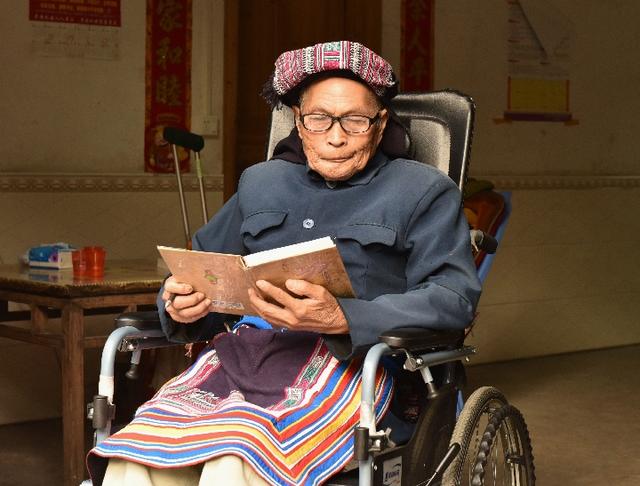Ethnic minority man helps preserve traditional Yao folk songs
Zhao Zide, 75, recently drew public attention as he was found to have written down almost 2,000 Yao folk songs, which are usually passed on from mouth to mouth without written scripts.
When Zhao Zide was a young man, learning to sing folk songs was a prerequisite to finding true love.

"If you could not sing folk songs well, you would not be able to find a wife," said Zhao, 75, a resident of Huiyuan Yao Ethnic Township in Lanshan County, central China's Hunan Province.
With more than 3,100 registered residents, the township is located on the southern tip of Hunan. And of the township's population, about 60 percent are of the Yao ethnic minority.
The local people are famous for their Yao folk songs, which developed during the Tang (618-907) and Song (1127-1276) dynasties and thrived during the Ming (1368-1644) and Qing (1644-1911) dynasties. Singing Yao songs was a huge part of their lives.
Zhao recently drew public attention as he was found to have written down almost 2,000 Yao folk songs, which are usually passed on from mouth to mouth without written scripts.
"Yao folk songs derive from Yao people and most were created by impulse," Zhao said. "For example, the Thank You Tea Song is sung when guests take their first sips of tea, to show their appreciation for the hosts' hospitality, while the Double Ninth Festival Song wishes for longevity and health for the elderly."
Zhao said that local folk songs were first created by his ancestors to record the history of the Yao people.
"Yao songs are a history book with a voice," he said.
Due to the influence of his parents, Zhao started to learn Yao songs aged 23. The songs are usually antiphonal, and people should "sing the songs against each other, just like a 'sing-off'," he said.
"When a young man needed to get married, he should sing folk songs against the team of the woman's family and friends," he said.
Zhao said that he once accompanied a friend on a date with a Yao woman decades ago. They walked along more than 30 km of mountain roads and sang songs against the woman's group.
"We sang for an entire night without closing our eyes, and when we finished all the songs we prepared, we began to improvise," Zhao said. "I also wrote down more than 20 of the songs we sang that night."
Zhao said that as the songs had no written form, he began to put down all the Yao songs he had collected into his "song books" in the 1990s. So far, the songs have filled up three books.
Local authorities caught wind of his efforts, and in 2016, Yao songs were put on one of Hunan's provincial-level intangible cultural heritage lists. Zhao was later named the oldest "Yao song inheritor" in the county.
"These days, most young people have gone to big cities for better-paid jobs, so fewer people in the township can sing Yao songs," he said.
To help pass on the music, Zhao would invite others in his village to sing the songs in public.
To his relief, Zhao's daughter is fascinated by the songs and has become a prominent folk singer in the local area. She also teaches Yao songs to young people.
"Yao folk songs are our treasure and we need to protect this cultural heritage," Zhao said.

